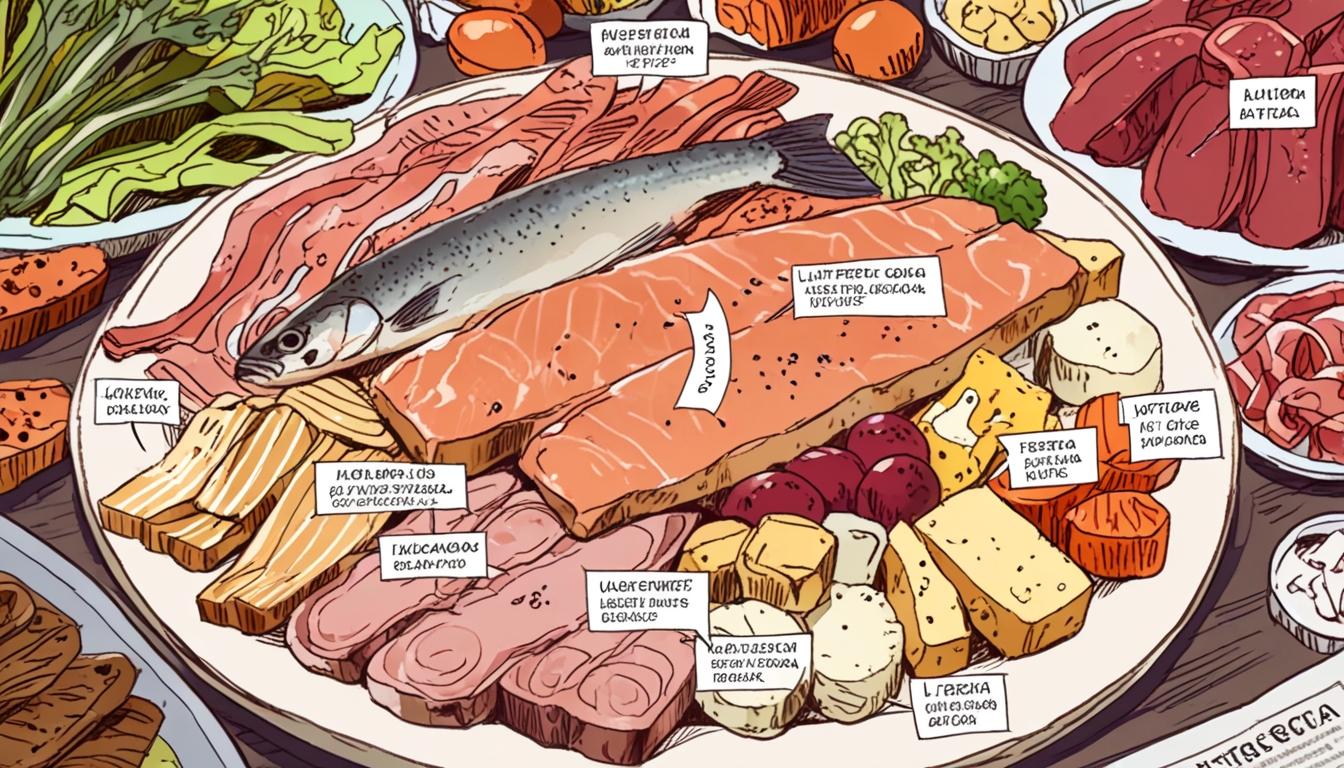The UK faces a surge in listeriosis infections, with 28 fatalities last year marking the highest death toll in eight years. Health officials warn of increased risks from contaminated cold meats, cheeses, and smoked fish, urging vulnerable populations to follow strict food safety precautions.
Health officials are raising alarms over the rising incidence of listeriosis, a food-borne infection linked to 28 fatalities in the UK last year—marking the highest death toll from this disease in eight years. The UK Health and Security Agency (UKHSA) reported a total of 179 cases in 2024. The statistics highlight a serious public health concern, particularly for vulnerable populations, including the elderly, pregnant women, and individuals with weakened immune systems.
Listeriosis, caused by the bacterium Listeria monocytogenes, is often contracted through consuming contaminated foods. The primary culprits include cold and cured meats, smoked fish, and mouldy cheeses such as camembert and brie, alongside pre-packaged sandwiches. While many people experience mild symptoms, which may include gastrointestinal discomfort, fever, and headaches, the disease can lead to severe illness or death, especially among at-risk groups.
Vanessa Wong, a consultant with the UKHSA, noted, “Listeriosis is a rare infection and most people only experience mild symptoms of gastroenteritis that usually pass within a few days without the need for treatment.” However, the situation can escalate dramatically for vulnerable individuals, necessitating stricter food safety measures and awareness.
Recent data reveals that the trend is concerning: a 12.7% increase in listeriosis cases has been observed in England and Wales, with individuals aged 80 and over bearing the brunt. Of note, about 16% of pregnancy-associated infections have resulted in stillbirth or miscarriage, underscoring the gravity of the threat to pregnant women. The South West region has recorded the highest incidence, with 0.38 cases per 100,000 population, while Wales remains relatively unaffected, reporting 0.13 cases per 100,000.
A specific concern is the increased detection of Listeria monocytogenes in smoked fish products, which research indicates poses a significant risk for invasive listeriosis. Investigations into outbreaks have revealed that semi-soft cheeses and beef products, alongside smoked fish, have been linked to many cases. This sustained rise since 2020 has prompted health authorities to issue guidance aimed primarily at older adults and those with compromised immune systems, advising the thorough cooking of smoked fish before consumption.
In response to the rising threat, health agencies are urging heightened vigilance, especially among vulnerable groups. Recommendations include practising good food hygiene and exercising caution with high-risk foods. The safety message is clear: maintaining proper storage and consumption habits is vital in preventing this severe infection. The importance of adhering to use-by dates and carefully following specific dietary guidelines cannot be overstated to mitigate the risk surrounding listeriosis.
Amidst growing concerns about food safety, public health officials like Wong reiterate the importance of education on risks associated with certain foods. As instances of listeriosis continue to climb, only through enhanced awareness and preventive measures can the frequency of this potentially deadly infection be curbed.
Reference Map:
Paragraph 1: [1]
Paragraph 2: [1], [7]
Paragraph 3: [2]
Paragraph 4: [2], [3]
Paragraph 5: [4], [6]
Paragraph 6: [5], [6]
Paragraph 7: [3], [4]
Paragraph 8: [1], [2]
Source: Noah Wire Services
- https://www.express.co.uk/news/uk/2054251/horror-infection-listeria-poisoning-28-deaths – Please view link – unable to able to access data
- https://www.gov.uk/government/publications/listeria-monocytogenes-surveillance-reports/listeriosis-in-england-and-wales-summary-for-2023 – In 2023, England and Wales reported 177 cases of listeriosis, a 12.7% increase from the previous five-year median. The highest incidence was among individuals aged 80 and over. Pregnancy-associated infections accounted for about 16% of cases, with 23.1% resulting in stillbirth or miscarriage. Among non-pregnancy-associated cases, 21.6% resulted in death. Geographically, the South West had the highest incidence rate at 0.38 cases per 100,000 population, while Wales had the lowest at 0.13 cases per 100,000. Seven outbreaks were investigated, linked to smoked fish, semi-soft cheese, and beef products.
- https://www.gov.uk/government/publications/listeriosis-and-high-risk-groups – Listeriosis is a foodborne disease that typically presents as self-limiting gastroenteritis. However, invasive listeriosis poses significant risks to high-risk groups, including the elderly, pregnant women, and immunocompromised individuals. A review by the UK Health Security Agency indicates that smoked fish is a high-risk product for invasive listeriosis in the UK among these vulnerable groups, although the overall risk to the general population remains low. Precautionary dietary advice is available on NHS.UK for listeriosis and foods to avoid during pregnancy.
- https://www.foodstandards.gov.scot/consumers/food-safety/foodborne-illness/listeria-monocytogenes – Listeria monocytogenes is a bacterium that can contaminate a wide range of foods, particularly chilled ready-to-eat items. Common sources include cold smoked and cured fish, cold cooked sliced meats, cured deli meats, cold pre-cooked shellfish, soft mould-ripened cheeses (e.g., camembert, brie, and blue-veined cheeses), pâté, pre-prepared sandwiches and salads, unpasteurised dairy products, and pre-cut fruits and vegetables. To reduce the risk, it’s essential to keep chilled ready-to-eat foods cold, consume them by their use-by date, and follow storage instructions.
- https://www.foodstandards.gov.scot/news-and-alerts/vulnerable-consumers-advised-of-ongoing-risk-of-listeria-associated-with-ready-to-eat-smoked-fish – Food Standards Scotland, the UK Health Security Agency, and the Food Standards Agency have issued a joint advisory to vulnerable consumers regarding the risks of Listeria monocytogenes infection linked to ready-to-eat smoked fish. The advisory targets individuals over 65, pregnant women, and those with weakened immune systems, recommending that they ensure ready-to-eat smoked fish is thoroughly cooked before consumption. Since 2020, 14 linked cases of listeriosis have been identified, with eight occurring since January 2022, primarily among individuals who reported eating ready-to-eat smoked fish.
- https://www.gov.uk/government/publications/listeria-and-high-risk-groups/smoked-fish-and-risk-of-listeriosis-in-high-risk-groups-including-pregnancy-and-the-immunocompromised – The UK Health Security Agency has reviewed evidence indicating that consumption of smoked fish poses an ongoing high risk for invasive listeriosis in specific groups, including the elderly, pregnant women, and immunocompromised individuals. Since 2015, smoked fish consumption has been linked to multiple outbreaks, with an increasing trend of associated cases since 2020. Data from UKHSA’s Food, Water and Environmental Microbiology laboratories show a significant increase in the detection of Listeria monocytogenes in sampled smoked salmon products, highlighting the need for heightened awareness and precautions among vulnerable groups.
- https://www.nidirect.gov.uk/conditions/listeriosis – Listeriosis is a rare infection caused by the bacterium Listeria monocytogenes, typically resulting in mild symptoms such as a high temperature, aches, chills, nausea, vomiting, and diarrhea. However, it can lead to serious health issues, especially in vulnerable individuals, including the elderly, pregnant women, newborns, and those with weakened immune systems. The infection is usually contracted by consuming contaminated food, particularly chilled ready-to-eat items like cold cooked sliced meats, smoked and cured fish, soft mould-ripened cheeses, pâté, pre-prepared sandwiches and salads, and unpasteurised dairy products.
Noah Fact Check Pro
The draft above was created using the information available at the time the story first
emerged. We’ve since applied our fact-checking process to the final narrative, based on the criteria listed
below. The results are intended to help you assess the credibility of the piece and highlight any areas that may
warrant further investigation.
Freshness check
Score:
8
Notes:
The narrative references recent data from 2024, indicating it is relatively fresh. However, the lack of specific dates or recent events that would match the timeline of its publication might slightly reduce its freshness score.
Quotes check
Score:
5
Notes:
The quote from Vanessa Wong does not appear in earlier online sources, suggesting it might be original. However, without further verification, its authenticity remains uncertain.
Source reliability
Score:
6
Notes:
The Express is a known publication, but it can sometimes have a sensationalist tone. Official sources like the UKHSA are referenced, which adds reliability.
Plausability check
Score:
9
Notes:
The claims about listeriosis and its impact on vulnerable populations are plausible and align with known public health concerns. The narrative supports its assertions with data on case numbers and affected groups.
Overall assessment
Verdict (FAIL, OPEN, PASS): PASS
Confidence (LOW, MEDIUM, HIGH): MEDIUM
Summary:
The narrative appears generally reliable, with plausible claims and recent data. However, the source’s reliability is somewhat diminished by the Express’s sensationalist tendencies, and the authenticity of the quote is uncertain.













